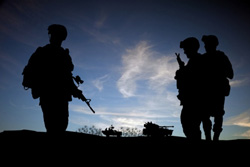Military Contributions to International Stability: Since the end of the Cold War by Japan and the UK
7 November 2012, London
|

After the end of the Cold War, international peacekeeping for military forces took on a new significance, as the end of superpower rivalry allowed suppressed regional tensions around the world to reappear with renewed vigour. In the 1990s, conflict in the Balkans challenged European and NATO countries to find ways to restore stability and similar challenges also arose in Africa. In the new millennium, particularly after the terrorist attacks of 11 September 2001, Western nations and their allies found themselves in a range of operations, from Iraq and Afghanistan to the counter-piracy operations in the Gulf of Aden and off the Horn of Africa. Both the UK and Japan have adapted their use of armed forces to meet these challenges, in the UK’s case reflecting its responsibilities for global stability as a permanent member of the UN Security Council, and in Japan’s case reflecting long-held ambitions for more permanent membership of the UNSC, which has been strongly supported by the UK. How have the two countries separately reacted to these challenges and what lessons can they learn from each other? This question will be addressed by Professor Chiyuki Aoi, of Aoyama Gakuin University, and Brigadier Ben Barry, of IISS. A panel discussion after the presentations will be chaired by Simon Chelton.
Contributors: Brigadier Ben Barry, Chiyuki Aoi
Free but booking is essential at www.dajf.org.uk/bookin |
|
|
7 November 2012 6:00pm |
 |
|
Daiwa Foundation Japan House, 13 - 14 Cornwall Terrace, London NW1 4QP. Nearest tube: Baker Street |
|
Tel:020 7486 4348
Email:office@dajf.org.uk
|
|
|
|
The Daiwa Anglo-Japanese Foundation |
 |



